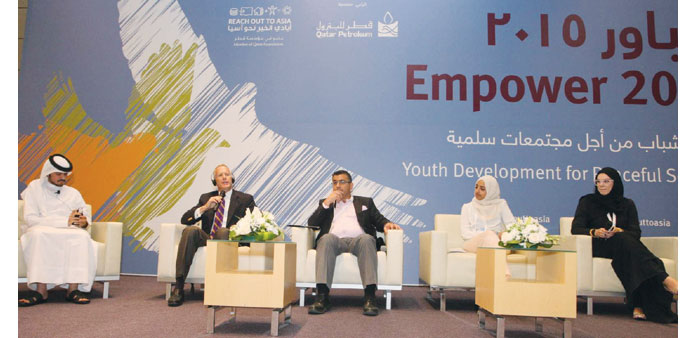By Joseph Varghese
Staff Reporter
The distance between the youth and the decision tables must be reduced, opined experts, during a panel discussion on “Youth Development and Peaceful Societies” at Empower 2015 conference yesterday.
Empower 2015, organised by Reach Out To Asia (Rota), concludes today at the Student Centre of Hamad Bin Khalifa University in Education City. More than 450 youths between the ages of 16-27 years, representing 23 countries, are attending the conference.
Habbes al-Marri, from Rota, moderated the discussion which was attended by Steve Culbertson, president and CEO, Youth Service America; Lewis Lewis, deputy project manager, Active Qatar Campaign; Sahar al-Ansari, local young participant and Farahnaz Yousif, young International Participant.
The moderator focused on three particular topics: What does your organisation do to promote youth development for peaceful societies and why is this important; It is widely accepted that youth are major stakeholders in the promotion of peace, where and how do you believe youth efforts can be most effective; and what are the greatest challenges to youth development for peaceful societies?
Culbertson stated that most of the decisions are taken by elders of both the genders at most of the levels. “The youth are still away from the decision-making tables. This must be avoided.”
He pointed out that today’s youth have to work with the problems that they face and try to find solutions. “It is the language that needs to be changed. The youth are not the hope of future or the leaders of tomorrow. They are the leaders of today and young people have to live in the present rather than waiting to live in the future.”
Lewis observed that the youth have the special power to change the world for better. “Every spark in your life can be turned for the betterment of the society and can be instrumental in changing the course of the world. Use it wisely. Many people consider sport as a waste of time but we know that sport creates leaders. Sport also teaches how to respect ourselves and others.”
Both the young learners at the panel discussion echoed the sentiments of their senior colleagues and remarked that youth want their voices to be heard. Al-Ansari said: “We all know something which others do not know well. Everyone wants to be the heroes of their time. Youth have the power to change the world with their skills and passion.”
Yousif suggested that youth have to overcome the problems faced by them through creativity and collaboration.
The session showcased the work of some of the world’s leading organisations that have contributed to the development of youth for peaceful societies. The panellists also shared their personal as well as professional experience and reflections on the work being done by their respective organisations. Page 2

The panel members taking part in discussions. PICTURE: Nasar T K.
